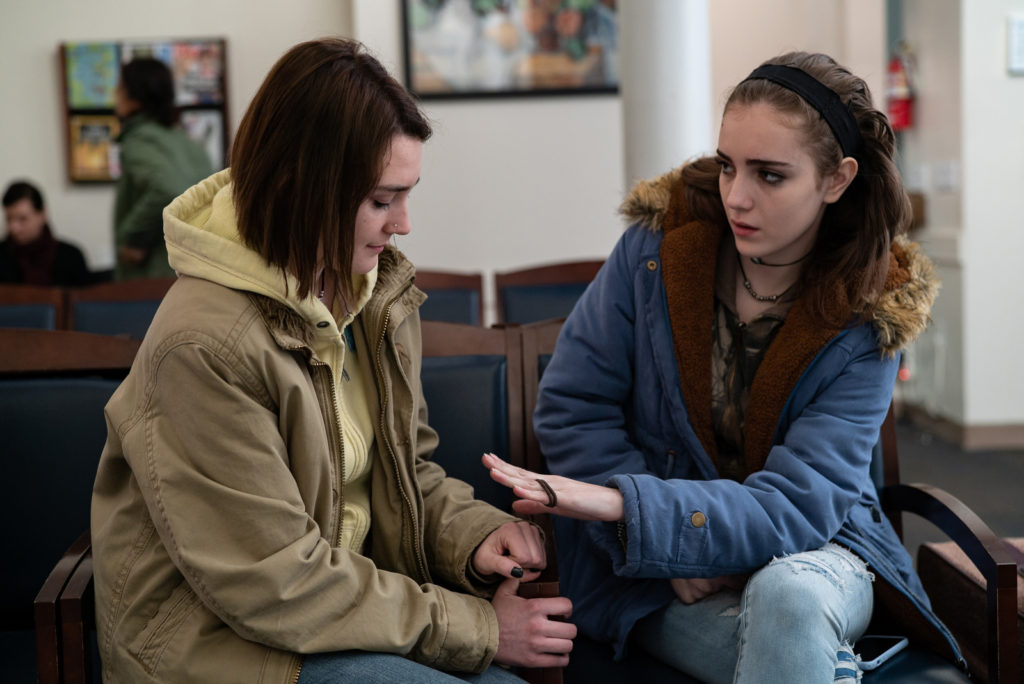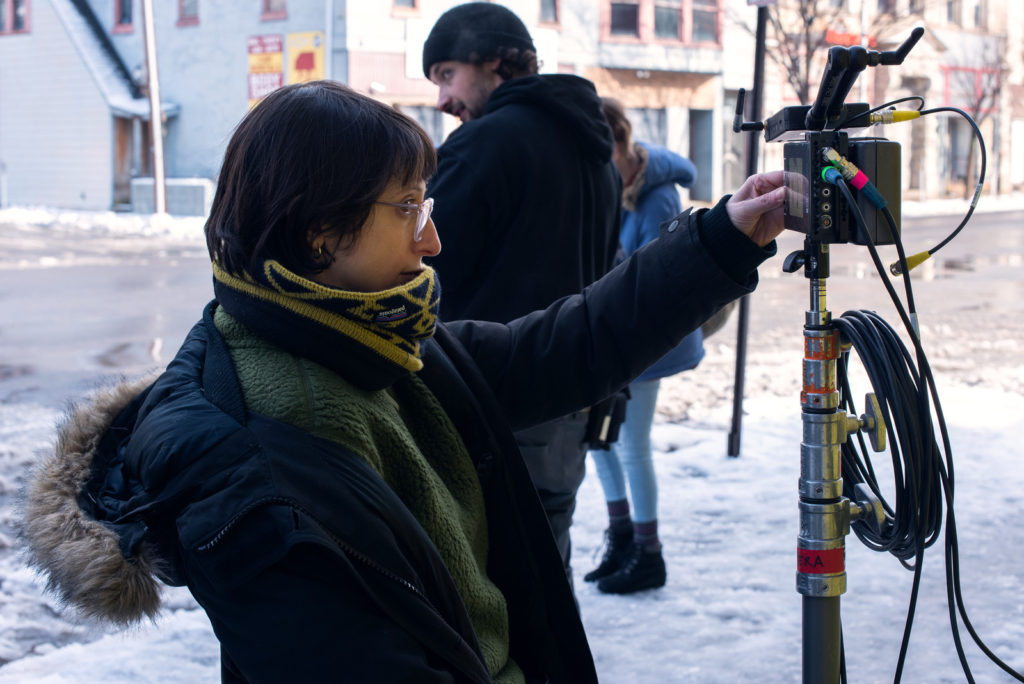Writer-director Eliza Hittman’s latest film, “Never Rarely Sometimes Always,” is an unflinching story about reproductive rights in the United States. Facing an unplanned pregnancy and a lack of support and options, teenage Autumn (Sidney Flanigan), alongside her cousin (Talia Ryder), travels from her rural Pennsylvania community to New York City to get an abortion. The Focus Features title has taken home prizes from Sundance and Berlinale and screened at the Athena Film Festival. It currently boasts a 100 percent “Fresh” rating on Rotten Tomatoes.
“Never Rarely Sometimes Always” marks Hittman’s third feature. She previously helmed “It Felt Like Love” and “Beach Rats,” as well as episodes of “High Maintenance” and “13 Reasons Why.” She won the Directing Award – Dramatic at Sundance 2017 for “Beach Rats.”
We recently sat down with Hittman to discuss making a film about abortion in 2020, its PG-13 rating, and her decision to cast two relatively unknown actresses as the leads.
“Never Rarely Sometimes Always” opens in select theaters March 13.
This interview has been edited.
W&H: How important was it to you to make a film about abortion and a woman’s right to choose? Where did the idea stem from?
EH: I felt it was essential to make a film about the very real barriers that a woman encounters in trying to get a legal abortion, and I thought it was a story I hadn’t seen before.
I started to think about the film in 2012 after I read a newspaper article about the death of Savita Halappanavar, an Indian woman who died in a hospital in Galway of blood poisoning after being refused a life-saving abortion. I started reading articles about all the women who traveled from Ireland across the Irish Sea to London and back in one day. It was a journey I hadn’t known about before, and the little lightbulb in my head went on and said there’s a movie in there.
W&H: What has the road been like to make this film?
EH: I wrote a treatment for a movie set in Ireland, and I thought it was too ambitious, that I wouldn’t be supported in making that story as a U.S. filmmaker. So, I decided to imagine what the U.S. version would be like. I started pitching the movie when Obama was President, and I don’t think people saw its relevance [at that time]. The response was that it would make a fascinating documentary, so I put the project aside even though it was gestating inside of me for a very long time.
When Trump was elected, I decided to come back to it and did extensive research on the film. Some of it was experiential and first-hand — me taking a Greyhound bus from rural Pennsylvania to New York, me making little video sketches out the window of landscapes, lights, people on the bus at Port Authority, to going into pregnancy care centers, taking pregnancy tests, and meeting with social workers at Planned Parenthood in New York.
W&H: You just won the Silver Bear Grand Jury Prize at the Berlin Film Festival, despite jury president Jeremy Irons’ once-stated anti-abortion views, which he distanced himself from. What was that experience like?
EH: I was a little disappointed when I found out he was the head of the jury. For a moment, I wondered if I should write an open letter about how his past comments were destructive. It made me wary of presenting at the festival.
But simultaneously, I didn’t make this film to preach to the choir. There are a lot of men in reality like Jeremy Irons out there who share those beliefs. He’s not a unicorn. I was relieved there was also gender balance and parity on that jury. There were a lot of women to help educate him about the importance of the movie, and I believe that it’s because of their role on the jury that we won such a prestigious award.
W&H: Speaking of gender balance, you utilize the female gaze in your films. What did you want to reveal about the characters through these shots in “Never Rarely Sometimes Always”?
EH: I wanted to put the audience in the shoes of the main character and to experience the tension the two lead characters feel of walking through the world each day. We all learn how to navigate them, deflect them, and we essentially become desensitized to these feelings.

“Never Rarely Sometimes Always”: Angal Field/Focus Features
W&H: “Never Rarely Sometimes Always” feels like a personal film, but it also feels somewhat political. Do you consider it either or both of those things?
EH: It’s not my story. It’s fictional. I wanted it to be infused with intimacy. Of course, Autumn [the main character] is doing something for herself that’s very transgressive and political at the same time. Just the simple act of getting on a bus and traveling to New York City is a statement.
W&H: The friendship between the two main female characters is vital in this film. Was that important to you when writing the screenplay?
EH: In the initial conceptualizing of the film, I went through a lot of possibilities about who would take her on this journey. Would she go alone or with her mother? I just reflected on my teenage years. I grew up in Brooklyn, and I went to Planned Parenthood with friends often who were panicked about many things — being pregnant, worried they might have an STI, a yeast infection. Whatever it was, I just remembered your friends are your first line of support.
W&H: Is the whole story fictional?
EH: The story is imagined and shaped through things that social workers told me when I consulted Planned Parenthood. It’s very much an imagined journey — thinking about how taboo it is and stigmatized and how she wouldn’t want to tell anybody. Part of why they do a pinky swear at Port Authority is they’re saying they’ll never speak about kissing this guy or you going to the doctor again. It’s about how much we bury these kinds of moments in our lives.
W&H: There aren’t many males in your film. Is that intentional?
EH: I wanted to focus on female friendship and having men as part of the environment that they deal with every day.
W&H: The scenes at Planned Parenthood and the crisis pregnancy center seem very real. How true to life are those scenes?
EH: I spent the longest time developing these scenes. The social worker that interviews her is a real social worker. After I spent so much time working with her, I couldn’t imagine not having her in the film. It’s part of what makes the scene. Sidney is incredible, but I think she felt safe to perform and feel vulnerable in that way.
W&H: Sidney Flanigan and Talia Ryder put in such powerful, raw performances. You took a chance on them.
EH: The BBC [one of the film’s production companies] was very trusting, but I do think that people had a lot of anxiety about Sidney and what it meant to put the whole movie on her shoulders, including me. I believe Sidney had a lot of anxiety about being responsible for the entire film. It wasn’t a fair experience in some ways because her first day of acting was her first day on the set.
W&H: The film received a PG-13 rating from the MPA. Were you surprised, and do you hope more people will see the movie?
EH: To be honest, we sent them the film, they screened it, and the first rating it got was an R. I was so nervous. I thought it was because there was an abortion in it and was solely the topic of the film. Then they wrote us back and said actually that she says “fuck” three times, and if she says “fuck” one time, you can have a PG-13 rating. I was ecstatic because it was so easy to tweak two lines of dialogue, so it was a win.







